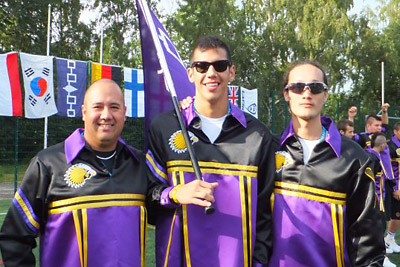Ansley Jemison imparts lessons from a life in lacrosse
By Susan Kelley

Ansley Jemison got his first lacrosse stick when he was 5 years old. "From then on, I've had a stick in my hand," said Jemison, the new residence hall director at Cornell's Akwe:kon, which was established in 1991 as the nation's first university residence hall to celebrate American Indian culture and heritage. "If you get down to the roots of the game, it's a very beautiful thing."
Lacrosse is not just a game for Jemison, a member of the Seneca Nation's Wolf Clan. He and many other Seneca consider lacrosse a healing game for their people, he said. "It's actually considered a ceremonial medicine. There can be a call for somebody who needs to have a lacrosse game done in their honor, to try to heal somebody in the community. ... The harder you play, the more the medicine comes on."
Lacrosse has been a constant for Jemison. He played on the Allegany Reservation where he spent time as a child, at the site of a 17th-century Seneca village where he lived as a teenager and for Division 1 champs Syracuse University.
Now, Jemison is using his lacrosse and other skills to motivate Cornell students, especially those of Native American descent. In his spare time, he is also assistant coach for the Iroquois Nationals lacrosse team, which is in Finland competing in the Men's Under-19 World Championships July 12-21.
Jemison was born in Buffalo, N.Y., and lived with his aunt on the Allegany Reservation in Cattaraugus County, N.Y., and with his mother in Brooklyn. In high school, he lived on Ganondagan, a National Historic Landmark that is the site of a 17th-century Seneca village, where his father was a caretaker.
That's where he began to excel at lacrosse. At 15, he made the first Iroqouis Nationals' Under 19 team, which gave the Nationals' their first international victory in 1992.
But Jemison didn't have the grades in high school to get recruited by colleges. "That was really the turning point for me," he said. "If you want to play at a top-level [college] lacrosse program, you have to have your academics together as well."
He managed to get a scholarship at a Connecticut prep school, where he focused on his studies. In 1995, he was recruited to play lacrosse at Syracuse University, where he majored in communication. He played for the lacrosse powerhouse for four years.
But when he graduated and took off his jersey for the last time, it left him without an identity and at a loss with what to do next with his life. And then the economic downturn meant six years of hard times. He lived in his car briefly in Taos, N.M., and eventually worked construction and managed a restaurant. "I basically got a master's degree in life while I was there," he said.
Family ties drew him back to the Northeast, where a former Syracuse teammate recruited him to coach the Iroquois Nationals and his high school coach recruited him to coach the lacrosse team of St. John Fisher College. Both of those experiences have developed his mentoring skills. Since then he's been helping Native American youths get to college through lacrosse and encouraging Akwe:kon students to excel at Cornell.
"Now I'm able to influence and help other Native kids through my hard times ... to convince them and say, hey, it's going to be tough, it's going to be rough, but you know what? It's going to come out. And I'll be here for you.
"That's just that little bit of convincing that some students need. To see that somebody else who's been successful at something that they didn't think was attainable is enough for them to believe in themselves."
Get Cornell news delivered right to your inbox.
Subscribe